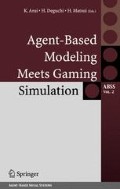Conclusions
In this chapter we have presented an efiective approach for identification of user types in virtual worlds. Two types of input features were discussed, action-based features and item-based features. The former type uses the information on the frequency of each type of action that each user performed. The latter one uses the information on the frequency of each type of item that each user acquired. AMBR, adopted as the classifier, could successfully identify the type of unknown user agents. In addition, it could give higher performance with the item-based features. In future work, we plan to conduct experiments using agents with more complicated behaviors and to investigate use of order information in either action sequences or item sequences. Eventually, we will apply our findings to real user data.
Access this chapter
Tax calculation will be finalised at checkout
Purchases are for personal use only
Preview
Unable to display preview. Download preview PDF.
References
Jarett A, Estanislao J, Dunin E, et al. (2003) IGDA Online Games White Paper, 2nd ed.
Thawonmas R, Yagome T (2004) Application of the artificial society approach to multiplayer online games: a case study on efiects of a robot rental mechanism. Proceedings of the 3rd International Conference on Application and Development of Computer Games (ADCOG 2004), Hong Kong, pp 12–17
Bartle R (1996) Hearts, clubs, diamonds, spades: players who suit MUDs. The Journal of Virtual Environments 1(1)
Tveit A, Rein O, Jorgen VI, et al. (2003) Scalable agent-based simulation of players in massively multiplayer online games. Proceedings of the 8th Scandinavian Conference on Artificial Intelligence (SCAI 2003), Bergen, Norway
Epstein J, Axtell R (1996) Growing artificial societies: social science from the bottom up. MIT, Brookings, MA
Thawonmas R, Ho JY, Matsumoto Y (2003) Identification of player types in massively multiplayer online games. Proceedings of the 34th Annual Conference of International Simulation and Gaming Association (ISAGA 2003), Chiba, Japan, pp 893–900
Ho JY, Matsumoto Y, Thawonmas R (2003) MMOG player identification: a step toward CRM of MMOGs. Proceedings of the 6th Pacific Rim International Workshop on Multi-Agents(PRIMA2003), Seoul, Korea, pp 81–92
Ho JY, Thawonmas R (2004) Episode detection with vector space model in agent behavior sequences of MMOGs. Proceedings of Future Business Technology Conference 2004 (FUBUTEC’2004), Fontainebleau, France, pp 47–54
Berry M, Linofi G (1997) Data mining techniques-for marketing, sales, and customer support. Wiley, New York
Weiss S, Kulikowski C (1991) Computer systems that learn. Morgan Kaufmann, San Mateo, CA
Author information
Authors and Affiliations
Editor information
Editors and Affiliations
Rights and permissions
Copyright information
© 2005 Springer-Verlag Tokyo
About this chapter
Cite this chapter
Thawonmas, R., Ho, JY., Matsumoto, Y. (2005). User Type Identification in Virtual Worlds. In: Arai, K., Deguchi, H., Matsui, H. (eds) Agent-Based Modeling Meets Gaming Simulation. Agent-Based Social Systems, vol 2. Springer, Tokyo. https://doi.org/10.1007/4-431-29427-9_9
Download citation
DOI: https://doi.org/10.1007/4-431-29427-9_9
Published:
Publisher Name: Springer, Tokyo
Print ISBN: 978-4-431-29426-9
Online ISBN: 978-4-431-29427-6
eBook Packages: Humanities, Social Sciences and LawSocial Sciences (R0)

